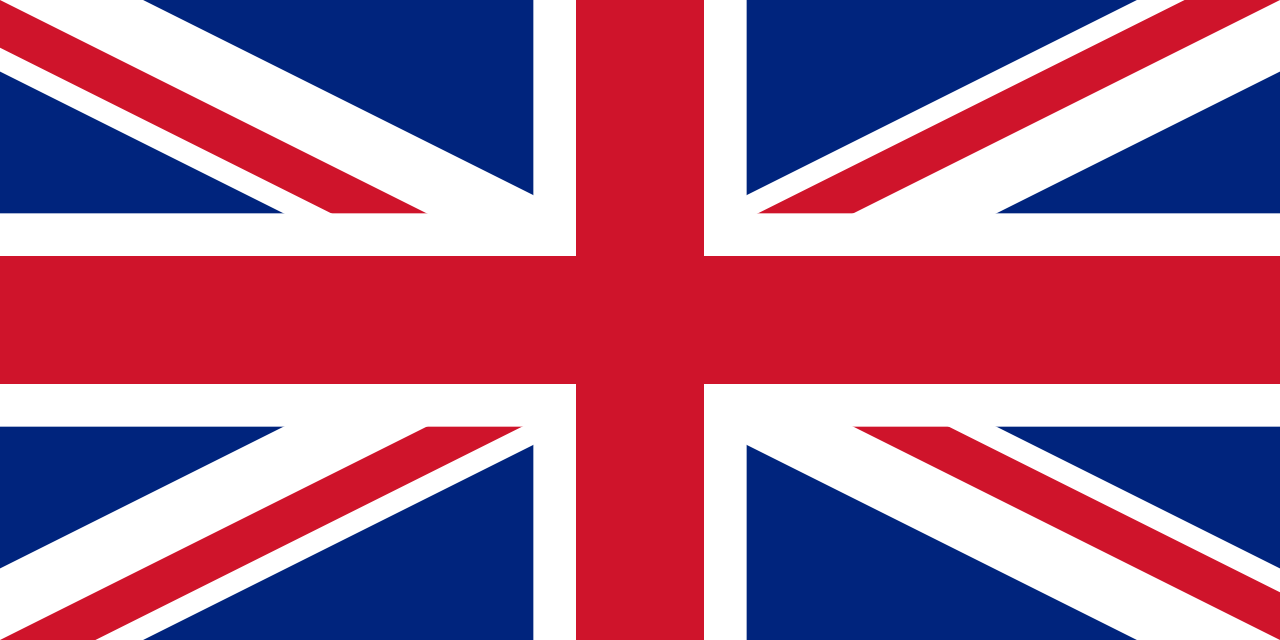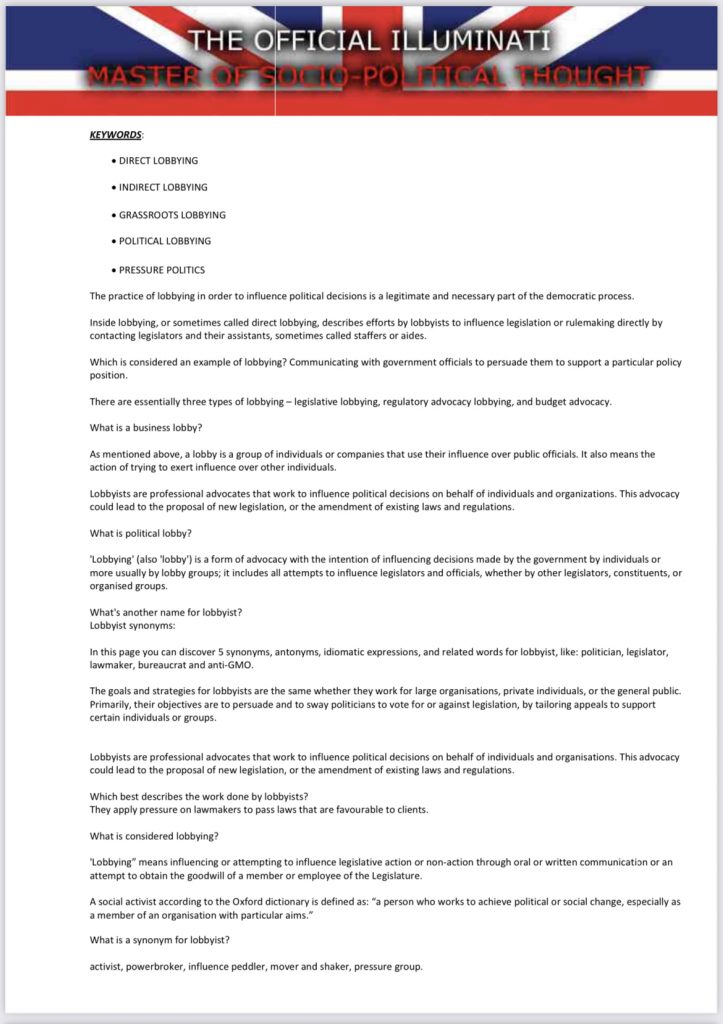PRESSURE-GROUP ACTIVITY
1) GROUPS ATTEMPT TO INFLUENCE GOVERNMENT DIRECTLY AND PRIVATELY;
IF THIS FAILS TO BRING THE DESIRED RESULT …
2) GROUPS LOBBY MPS, WHO:
• QUESTION MINISTERS
• WRITE TO CIVIL SERVANTS
• RAISE ISSUES IN PARTY MEETINGS
• TABLE AMENDMENTS
• TABLE ‘EARLY DAY MOTIONS’
• INTRODUCE PRIVATE MEMBERS’ BILLS
IF THIS FAILS …
3) GROUPS MAY TURN TO PUBLIC CAMPAIGN:
• POSTERS
• MAIL
• MEDIA ADVERTISEMENTS
• FAVOURBLE ARTICLES IN THE QUALITY PRESS
• MARCHES
PUBLICITY MAY THEN PERSUADE MPS;
IF THIS FAILS …
4) SANCTIONS MAY BE USED:
• STRIKES
• BOYCOTTS
• VIOLENCE
AIMED AT AFFECTING THE PUBLIC, LEADING TO CALLS FOR GOVERNMENT ACTION
GROUPS MAY EXERT PRESSURE THROUGH ONE OR MORE OF THESE CHANNELS SIMULTANEOUSLY.
PRESSURE GROUPS
A pressure group can be described as an organised group that does not put up candidates for election, but seeks to influence government policy or legislation. They can also be described as ‘interest groups’, ‘lobby groups’ or ‘protest groups’. Some people avoid using the term ‘pressure group’ as it can inadvertently be interpreted as meaning the groups use actual pressure to achieve their aims, which does not necessarily happen. In Britain, the number of political parties is very small, whereas the number of pressure groups runs into thousands; as the membership of political parties has fallen, that of pressure groups has increased.
The term pressure group is a very wide definition that does not clearly distinguish between the groups that fall under the term. For example, a pressure group can be a huge organisation like the CBI (Confederation of British Industry), which represents 150,000 businesses, and it can also be a single-issue locally based organisation like CLARA (Central Area Leamington Resident’s Association), which represents less than 300 households campaigning to preserve and improve the town of Leamington Spa. The definition also does not distinguish between the more extreme pressure groups such as the Animal Liberation Front, whose campaigns include the illegal activities such as planting bombs, and the pressure groups such as the Institute for Public Policy Research (IPPR), which have links to the Labour government and regular contact with cabinet ministers.
The aim of all pressure groups is to influence the people who actually have the power to make decisions. Pressure groups do not look for the power of political office for themselves, but do seek to influence the decisions made by those who do hold this political power. Often pressure groups find themselves competing with rival pressure groups with the aim of gaining an advantage over them, but sometimes groups work together to achieve a common aim.
Pressure groups provide a means of popular participation in national politics between elections. They are sometimes able to gather sufficient support to force government to amend or even scrap legislation. For example, in March 1998 around 300,000 people went to London to protest about the Labour government’s rural policies – the ‘Countryside March’ – the government reacted by announcing plans for a Ministry of Rural Affairs and by publishing a white paper investigating all aspects of rural life.
Pressure groups also provide a means of participation in local politics between elections. For example, in 1994 the A452 Coordination Group campaigned to block plans by Warwickshire County Council to make the A452 a dual carriageway. After the group’s intense lobbying, the council dropped the plans. Pressure groups also act as a sense of specialist knowledge, and often have access to information that is highly valued by decision makers. For example, MENCAP and MIND – groups campaigning on behalf of people with mental disabilities – are often invited to give government briefings. In return, these groups have an input into the making of decisions, and they can also receive financial contributions direct from the government.
A pressure groups can use a variety of different methods to influence law. Firstly, it can merely inform legislators of its member’s preferences. Second it may well give money or time to help with an election campaign. Third, its members may threaten, as a group, to vote as a bloc. By doing this they promise to help a cooperative legislator, and threaten to harm a non-cooperative legislator. Fourth, a pressure group may speed up legislation by writing bills and helping legislators make progressive agreements. Finally, a pressure group my attempt to influence members of the executive, who have some law making input and who can partly decide the strength and effectiveness of law enforcement.
For some, pressure groups are a fundamental part of democracy. To others, pressure groups undermine the whole principle of democracy. Democracy is a system of government where decisions are arrived at by majoritarian principles with representatives elected at periodic elections where political equality and political freedom allow the voter an effective choice between competing candidates in a secret ballot. How do pressure groups fit in with this concept?
In the pluralist model of democracy, pressure groups play an essential role. Political parties cannot provide adequate representation for the full range of diverse interests and opinions in a modern democracy because their key function is to aggregate interests into a coherent political entity capable of governing the country. Pressure groups enable particular interests and causes to be heard and to exert influence in public decision and decision-making. Yet it is precisely the representation of specialist interests and of single issues which may give cause for concern, both in terms of the methods used to achieve objectives and of the undue power and influence which particular lobbies can exert.
Pluralists believe that pressure groups overcome the democratic deficit that builds up as most people’s political participation is to cast a vote every five years, this leading to people having little or no influence over decisions made between elections, and minority views not being represented. Pressure groups increase participation and access to the political system, thereby enhancing the quality of democracy. They complement and supplement electoral democracy in two main ways: first, by providing an important mechanism by which citizens can influence government between elections; and second by enabling opinions to be weighed as well as counted.
Pressure groups improve the quality of government. Consultation with affected groups is the rational way to make decisions in a free society. It makes government more efficient by enhancing the quality of the decision making process – the information and advice provided by groups helps to improve the quality of government policy and legislation.
Pressure groups are a product of freedom of association, which is a fundamental principle of liberal democracy. Freely operating pressure groups are essential to the effective functioning of liberal democracy in three main ways: they serve as vital intermediary institutions between government and society; they assist in the dispersal of political power; and they provide important counterweights to balance the concentration of power.
Pressure groups enable new concerns and issues to reach the political agenda, thereby facilitating social progress and preventing social stagnation. For example, the women’s and environmentalist movements.
Pressure groups increase social cohesion and political stability by providing a ‘safety-valve’ outlet for individual and collective grievances and demands.
Pressure groups assist the surveillance of the government by exposing information it would rather keep secret, thereby reinforcing and complementing work of opposition through political parties. Pressure groups thereby improve the accountability of decision makers to electorates.
Although few people would deny that pressure groups play an important role in British politics, critics have argued that this role may not be the one suggested by the pluralist model.
Pressure groups improve participation, but in an unequal way, benefiting the well organised but disadvantaging the weakly organised. In this sense, they work against – not in favour of – the public interest.
Pressure groups themselves may not be representative of their members. Their officers are not usually elected. Few groups have procedures for consulting their members. As a result, the views expressed by group officials may not be shared by the group’s members.
Although the views of pressure groups may sometimes be considered, they are likely to be ignored if they do not confirm with the ideology or agenda of the decision makers.
Pressure group activity gives people hope that they can make a difference. This hope is a distraction. The ruling class would rather that people put their energies into pressure group activities, which do not question the fundamentals of the system than into political activity, which seriously challenges the right of the elite to govern.
Group opposition can slow down or block desirable changes, thereby contributing to social immobilisation.
The in-egalitarian way that some groups operate increases social discontent and political instability by intensifying the sense of social frustration and injustice felt by disadvantaged and excluded sections of the population.
In Britain’s secretive political system, groups and parties combined are unable to mount effective opposition to government policies because they generally lack adequate information.
Large-scale demonstrations mounted by any group may lead to unpleasant clashes without the police, sometimes involving militants with their own agenda. This level of civil disobedience cannot be justified in today’s democratic system.
Pressure groups are an essential dimension of any democracy, yet they can endanger democracy if sectional groups undermine the public interest or if the methods they use are corrupt or intimidating.

